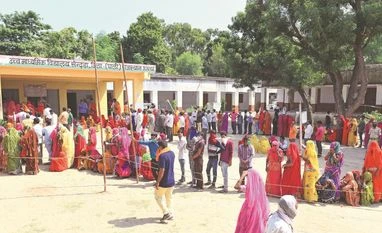A searing heatwave gripped parts of India on Saturday, with maximum temperatures ranging from 40 degrees Celsius to 46 degrees Celsius in many areas.
According to the India Meteorological Department (IMD), heatwave to severe heatwave conditions prevailed in Chhattisgarh, Jharkhand, Odisha, and Gangetic West Bengal during the day.
This ongoing heatwave affecting parts of Odisha, Jharkhand, and Gangetic West Bengal is the second heatwave spell this month. The first spell scorched parts of Telangana, Andhra Pradesh, Tamil Nadu, and Gujarat.
On Saturday, maximum temperatures at some places were recorded seven to eight degrees above normal.
Baripada and Boudh in Odisha recorded a maximum temperature of 45.2 degrees Celsius, Midnapore and Bankura in West Bengal recorded 44.5 degrees Celsius and 44.6 degrees Celsius, respectively. Daltonganj and Jamshedpur in Jharkhand registered 43.6 degrees Celsius and 43.5 degrees Celsius, respectively, while Rajnandgaon in Chhattisgarh reported 43 degrees Celsius.
The threshold for a heatwave is met when the maximum temperature of a weather station reaches at least 40 degrees Celsius in the plains, 37 degrees in the coastal areas, and 30 degrees in the hilly regions, and the departure from normal is at least 4.5 notches. A severe heatwave is declared if the departure from normal temperature exceeds 6.4 notches.
More From This Section
Amid the prevailing but weakening El Nino conditions, the IMD had earlier warned of extreme heat during the April-June period when around a billion people are expected to exercise their franchise during the seven-phase general elections, heightening concerns about vulnerability to heatwaves.
Voting for the first phase of elections took place on Friday (April 19).
The Met office said four to eight heatwave days are expected in different parts of the country in April against the normal of one to three days. Ten to 20 days of heatwave are expected against the normal of four to eight days in the entire April-June period.
The areas predicted to see more heatwave days are Madhya Pradesh, Gujarat, Odisha, Andhra Pradesh, Madhya Maharashtra, Vidarbha, Marathwada, Bihar, and Jharkhand. Some places may record over 20 days of heatwave.
The intense heat could strain power grids and result in water shortages in parts of India.
Global weather agencies, including the IMD, are also expecting La Nina conditions to develop later in the year.
El Nino conditions -- periodic warming of surface waters in the central Pacific Ocean -- are associated with weaker monsoon winds and drier conditions in India. La Nina conditions -- the antithesis of El Nino -- lead to plentiful rainfall during the monsoon season.
In a mid-April update, the IMD said India will experience above-normal cumulative rainfall in the 2024 monsoon season with La Nina conditions, expected to set in by August-September, being the dominant factor.
Monsoon is critical for India's agricultural landscape, with 52 per cent of the net cultivated area relying on it. It is also crucial for replenishing reservoirs critical for drinking water apart from power generation across the country.
)